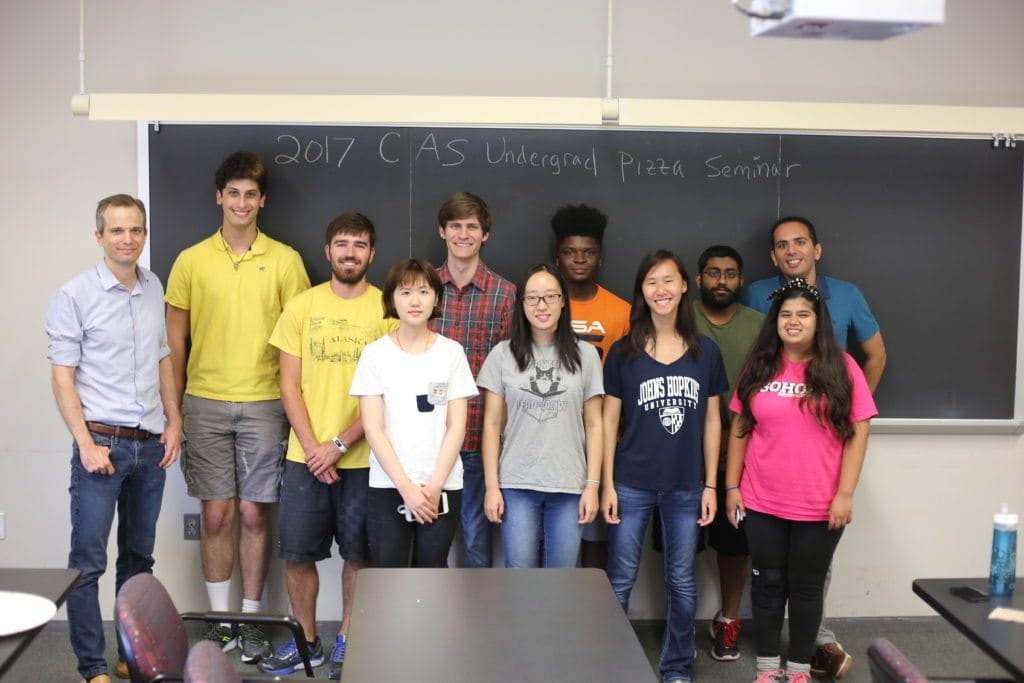We had a packed JHU CARE program in the summer of 2017! Here are some of our activities:
2017 CAS Undergraduate Pizza Seminar (CUPS) — a six-week series of talks aimed at undergraduate researchers in astronomy. The motivation of the series is to broaden the scientific and social experience of our summertime undergraduates. The forum is a pizza lunch with a presentation by a CAS astronomer covering the broad range of science pursued at CAS. We celebrated the last talk of the series with Dangerously Delicious Pies!
Here is the schedule of the CUPS seminar series for summer 2017:
- Thursday, June 22nd, 1200pm-100pm, Mark Kamionkowski, Cosmology, room 462
Wednesday, June 28th, 1200pm-100pm, Julian Krolik, Gravitational Waves, room 462 - Wednesday, July 5th, 1200pm-100pm, Karoline Gilbert, Local Group, room 462
- Wednesday, July 12th, 1200pm-100pm, Lauren Corlies, Galaxies, room 462
- Wednesday, July 19th, 1200pm-100pm, Kevin Schlaufman, Exoplanets, room 475
- Wednesday, July 26th, 1200pm-100pm, Toby Marriage, CMB, room 475

faculty advisor T. Marriage (left), postdoctoral advisor D. Nataf (right, top) and some of the Summer 2017 JHU CARE participants at the Pizza seminar
JHU CARE students funded by the Maryland Space Grant Consortium participated in the Consortium’s August research symposium. JHU CARE participants Andre Nottingham II and Wenzer Qin won the 1st-place Best Poster prize and the 2nd-place Best Speaker prize, respectively. Congratulations!
Example research projects completed by JHU CARE students in summer 2017:
— Wenzer Qin (advisor: Dr. David Nataf) investigated the use of Mira variable stars as cosmological distance indicators. She studied the effects of interstellar extinction and of Mira metallicity on the resulting distance measurements to the Galactic center and used theoretical models of Miras to improve the previously existing measurements.
— Anthony Flores (advisor: Dr. Dominika Wylezalek) measured velocities of ionized gas in host galaxies of active nuclei in the MaNGA survey. He discovered that galaxies containing actively accreting supermassive black holes are more likely to have winds of ionized gas moving at several hundred km/sec.
— Xuanyi (Suri) Wu (advisor: Dr. Kate Rowlands) measured sodium absorption in MaNGA galaxies, looking for signatures of infalling or outgoing neutral gas, which is a major component in galaxy formation.
— Andre Nottingham II (advisor: Dr. Ivan Padilla) worked with a research team to build a telescope to measure the polarization of the Cosmic Microwave Background. The goal of the project is to understand how the universe began.
— Channa Luke (advisor: Dr. Dominika Wylezalek) mapped morphologies of high-redshift galaxy clusters in the MadCOWs survey, which will enable testing of dark matter clustering models.


Figure caption: smoothed galaxy density field in a high-redshift cluster (C. Luke); map of ionized gas velocities in a galaxy with an active nucleus (A. Flores); signal-to-noise ratio of spectra for sodium measurements (X. Wu); distribution of brightnesses of the Mira variables (W. Qin).
 summer research interns in Nadia Zakamska’s group: Xuanyi (Suri) Wu, Anthony Flores, Wenzer Qin and Channa Luke at the bi-weekly group meeting
summer research interns in Nadia Zakamska’s group: Xuanyi (Suri) Wu, Anthony Flores, Wenzer Qin and Channa Luke at the bi-weekly group meeting
